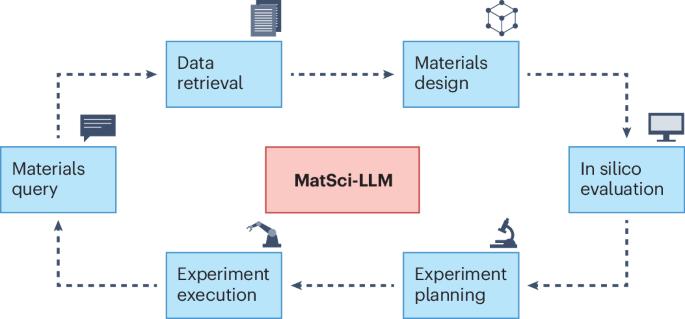为现实世界的材料发现启用大型语言模型
IF 23.9
1区 计算机科学
Q1 COMPUTER SCIENCE, ARTIFICIAL INTELLIGENCE
引用次数: 0
摘要
大型语言模型(llm)为加速材料科学的科学发现和知识传播创造了令人兴奋的可能性。虽然法学硕士已经成功地应用于选择科学问题和基本挑战,但它们目前还不足以成为实用的材料科学工具。在这个视角中,我们展示了法学硕士在材料科学方面的相关失败案例,揭示了法学硕士在理解和推理复杂、相互关联的材料科学知识方面的当前局限性。鉴于这些缺点,我们概述了一个框架,用于开发基于领域知识的材料科学法学硕士(MatSci-LLMs),这可以实现假设生成,然后进行假设检验,以应对有影响力的材料科学挑战。获得高性能matsci - llm的途径在很大程度上取决于构建高质量的多模态数据集,这些数据集来源于科学文献,其中存在各种信息提取挑战。因此,我们描述了需要克服的关键材料科学信息提取挑战,以建立大规模,多模态数据集,以捕获有价值的材料科学原理和更广泛的知识。本文章由计算机程序翻译,如有差异,请以英文原文为准。


Enabling large language models for real-world materials discovery
Large language models (LLMs) create exciting possibilities to accelerate scientific discovery and knowledge dissemination in materials science. While LLMs have been successfully applied to select scientific problems and rudimentary challenges, they currently fall short of being practical materials science tools. In this Perspective, we show relevant failure cases of LLMs in materials science that reveal the current limitations of LLMs related to comprehending and reasoning over complex, interconnected materials science knowledge. Given these shortcomings, we outline a framework for developing materials science LLMs (MatSci-LLMs) that are grounded in domain knowledge, which can enable hypothesis generation followed by hypothesis testing for impactful materials science challenges. The path to attaining performant MatSci-LLMs rests, in large part, on building high-quality, multimodal datasets sourced from scientific literature, where various information extraction challenges persist. As such, we describe key materials science information extraction challenges that need to be overcome to build large-scale, multimodal datasets that capture valuable materials science principles and broader knowledge. Miret and Krishnan discuss the promise of large language models (LLMs) to revolutionize materials discovery via automated processing of complex, interconnected, multimodal materials data. They also consider critical limitations and research opportunities needed to unblock LLMs for breakthroughs in materials science.
求助全文
通过发布文献求助,成功后即可免费获取论文全文。
去求助
来源期刊

Nature Machine Intelligence
Multiple-
CiteScore
36.90
自引率
2.10%
发文量
127
期刊介绍:
Nature Machine Intelligence is a distinguished publication that presents original research and reviews on various topics in machine learning, robotics, and AI. Our focus extends beyond these fields, exploring their profound impact on other scientific disciplines, as well as societal and industrial aspects. We recognize limitless possibilities wherein machine intelligence can augment human capabilities and knowledge in domains like scientific exploration, healthcare, medical diagnostics, and the creation of safe and sustainable cities, transportation, and agriculture. Simultaneously, we acknowledge the emergence of ethical, social, and legal concerns due to the rapid pace of advancements.
To foster interdisciplinary discussions on these far-reaching implications, Nature Machine Intelligence serves as a platform for dialogue facilitated through Comments, News Features, News & Views articles, and Correspondence. Our goal is to encourage a comprehensive examination of these subjects.
Similar to all Nature-branded journals, Nature Machine Intelligence operates under the guidance of a team of skilled editors. We adhere to a fair and rigorous peer-review process, ensuring high standards of copy-editing and production, swift publication, and editorial independence.
 求助内容:
求助内容: 应助结果提醒方式:
应助结果提醒方式:


